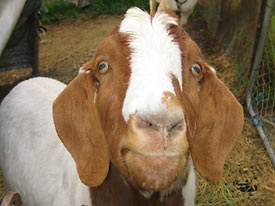UC Berkeley Web Feature
Friendly, four-footed firefighters: A chat with the goat lady
BERKELEY – On Cal Day, look for Lynn Huntsinger riding around campus in a two-goat cart pulled by loveable East Bay weed eaters Vladimir and Tinsel. Huntsinger will introduce the goats to visitors and talk about their skills in creating a fire-safe landscape. Public Affairs recently asked Huntsinger, an associate professor of environmental science, policy and management in the College of Natural Resources, about her bleating friends.
Q: What's the message of Vladimir and Tinsel?
 Vladimir the goat |
A: That livestock, including goats, can be a useful tool for controlling fire hazard and managing vegetation. They are also useful for controlling invasive weeds.
Too often, people have a negative perception of livestock grazing. Yet, managed correctly, it can provide environmental benefits as well as healthy, rangeland-produced foods. I hope people will appreciate the benefits of grazing in appropriate settings on public and private lands. Ruminants like Vlad and Tinsel have been partners with humans for about 10,000 years.
Kids also love goats, and I think it is important that they have an opportunity to meet these animals. I guess you could say, bottom line, is that V&T are out and about making friends.
Q: Not everyone can buy goats to keep the weeds down over the summer, so where are they most practical?
A: They are very practical on rough country where other methods of control are difficult, especially if the landowner does not want to use pesticides or other chemicals, or gas-powered, polluting machines. Goats avoid water and like hillsides, making them perfect for our hills.
However, each situation is unique, and the capacities of the various companies that lease goats vary, so the best thing would be to consult with one of several companies in the Bay Area and ask them if your property is suitable and how much it would cost to lease some goats. If a property is large enough, and the landowner wants to control vegetation that is palatable to cattle, a cattle producer might even pay for the privilege of removing flammable materials from a property.
Q: Do the two goats eat their way around the central campus, or are they employed for more lofty jobs up in the hills?
A: The goats graze in the hills.
Q: How long have Vladimir and Tinsel been on the job? Are they related?
A: Vlad and Tinsel are about six years old, and they are half-brothers. They come from a ranch featured in an excellent publication, the Niman Ranch Cookbook. This book has good information about sustainable, healthy livestock production and grazing.
Ironically, although they have lived in El Cerrito for their entire lives without a single neighbor complaint, the city has decided to hold a hearing on April 19 on whether or not we can keep them. Fortunately, all our neighbors have written strongly supportive letters - they appreciate the reduced fire hazard, as well as the beauty of the animals.
Q: Are the goats well behaved? Do they eat a lot of grass?
A: They are loving, gentle animals. They prefer brush, which makes them perfect for fire hazard management in brushy areas, but they also eat quite a lot of grass if brush is not available. Like all of us, they like a mix of things to eat. People can influence the amount they eat and what they eat - that is one of the great benefits of using domestic animals to influence vegetation. I hate to say it, but they may actually be anti-academics, as they will also eat books, especially if you are reading nearby.

